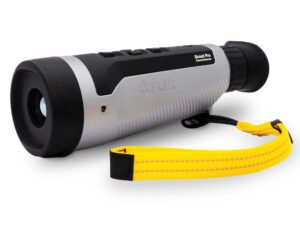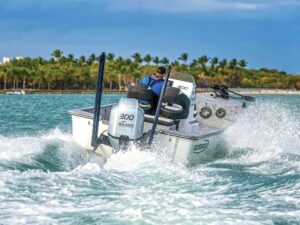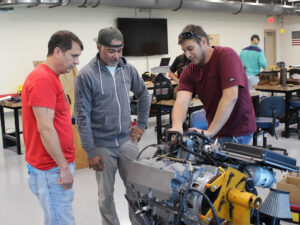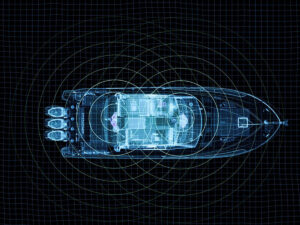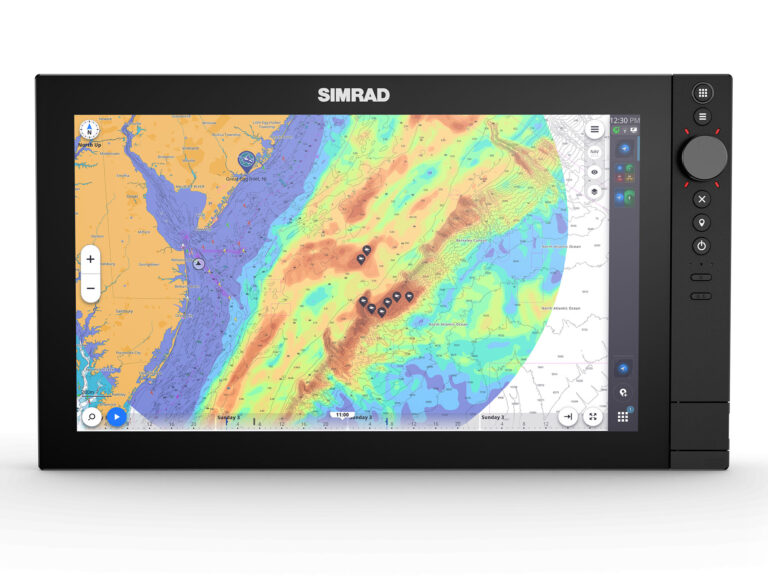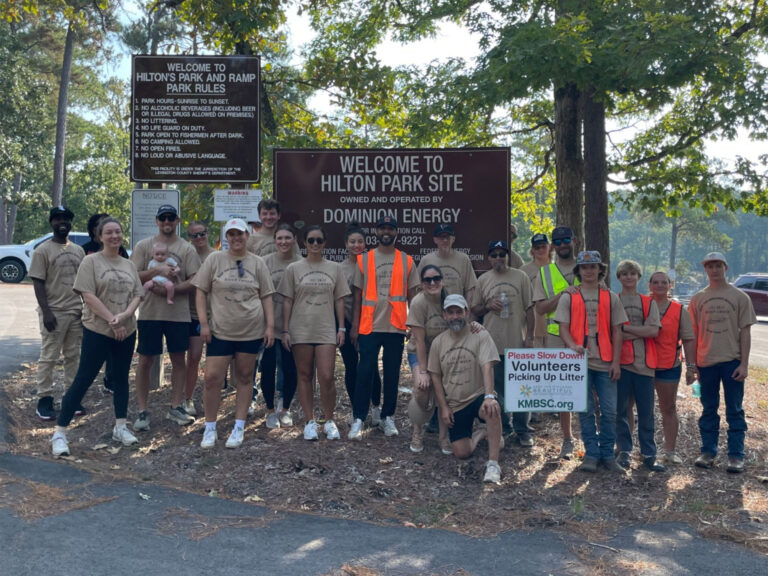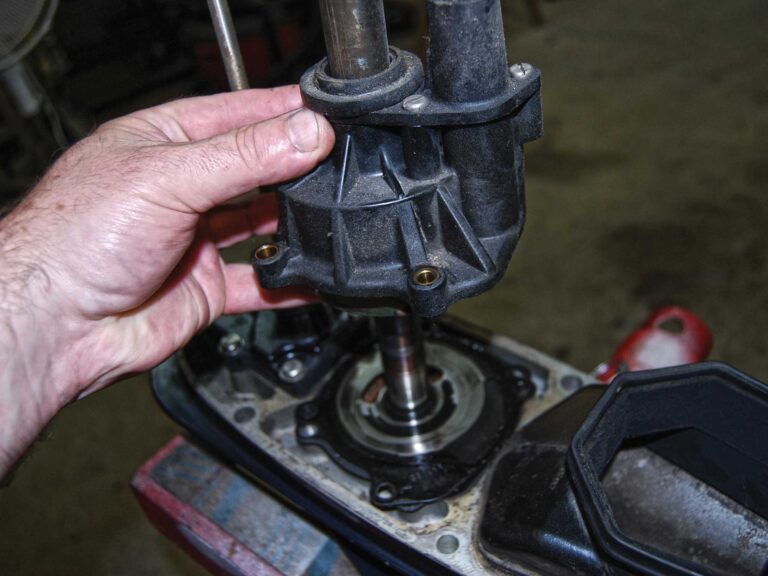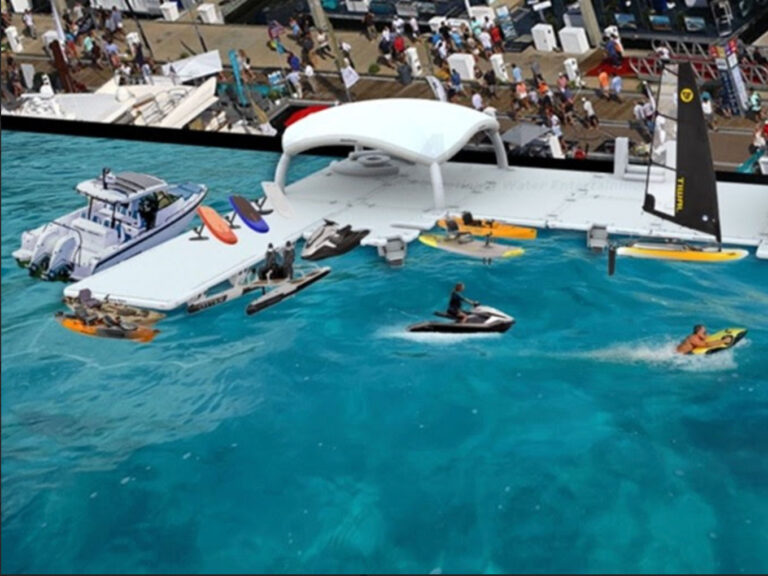
When I first starting writing about boats in 1996, I didn’t encounter many other women on the water, and few were on the business side of it. Articles would highlight a handful of pioneers who operated marinas, sold boats and crewed yacht charters, and then we’d all move on. Now, 25 years later, the world is different. In the 2020s, women aren’t just in boating—they’re everywhere in boating. They’re yacht designers, entrepreneurs, business owners, captains, instructors, mechanics and tech consultants—and they are not novelties. They are experts, and their unique experiences, perspectives and voices are driving recreational boating forward.

The Mechanic
Kaitlyn Schneider is a boat mechanic at Lakeside Marina in Oshkosh, Wisconsin. According to owner Joe Honsa, she’s fantastic at what she does.
Schneider grew up boating with her family on their 35-foot Baja cruiser. She discovered an aptitude for mechanics early on, helping her dad work on cars and also excelling in her high school’s offered auto mechanics courses.
“I was usually the only girl in my high school classes, or maybe one of two,” she recalls. “I liked that. It motivated me.”
Schneider’s career path unfolded when a representative from the Universal Technical Institute in Orlando, Florida, visited her high school.
“UTI was there to showcase everything they had to offer, including their Marine Mechanics Institute,” she says. “Working on boats was an easy decision for me. I was dead-set on it.”
Schneider graduated from high school in June 2013, started at UTI’s Marine Mechanics Institute in August, and graduated from its program a year later. She started work at Lakeside Marina in August 2014.
These days, Schneider is one of four people in Lakeside’s service department, and she remains the only woman. She works on boats that range from 16-foot aluminum fishing craft to mid-30s cruisers, and she holds certifications for MerCruiser engines and Mercury outboards.
Spring involves a deluge of work orders, checking fluids and electricals, and making sure the boats are performing correctly. Summer is all about fixing broken props, drives and fuel pumps; it also involves what Schneider calls “the game of diagnostics,” from engine and electrical issues to oil lines coming off.
When fall arrives, she changes oil, winterizes water systems and engines, and handles shrink-wrapping. One thing is certain: The life of a boat mechanic is never dull, especially during COVID-19.
“We’ve been crazy busy,” she says. “The world definitely didn’t stop for us.”
Schneider says she loves what she does, whether accessing a difficult engine compartment, hooking up the tractor to launch a boat at the ramp, or going on a delivery.
“The deliveries are super fun,” she says. “I get to engage with customers, a mix of experienced and new boaters. That’s always interesting.
“During the season, I might get five boat rides a day,” she adds. “I’m in the sun, outside all the time. It’s awesome.”

The Designer
This year, powerboat racing enthusiasts are catching a glimpse of a new concept boat that seamlessly blends electric power with the sleek sexiness of sports cars and the pure adrenaline of offshore racing. It’s called the RaceBird, and its co-creator is a Norwegian yacht designer, Sophi Horne.
Horne grew up on the water, enjoying competitive sailing and the family motorboat. The self-described tomboy even built her own sailboat.
“They found me and my little sister just as we were ready to sail off,” Horne remembers, laughing. “I was always passionate about building, but I never believed I would end up designing boats.”
Horne initially pursued a career in branding and graphic design, landing at SSH Maritime as creative director. Boat design, she says, just seemed too big. Then she was introduced to the naval architects.
“[Director] James Frangi believed in me,” she says. “I went back to school for my bachelor’s degree.”
Horne attended Westerdals School of Design, Communication and Technology in Oslo, graduating in 2017. One day, sitting in the airport in Paris, she had an idea.
“I wanted to design a boat that could be available to more people,” she says. “I was thinking of the people who can’t afford a yacht but want to spend the summer on the water.”

Coming from Oslo, Horne already was a fan of electric cars, and she wanted this new boat to feature electric power—cool electric power.
“I want sleek sports cars, not bubbly, cute electric cars,” she notes. “Now, Formula E, that’s cool, and they went electric. So, I wanted to be creative and daring, and to push the industry a bit. I was already an outsider, so if I failed, I failed.”
Drawing inspiration from the auto industry, Horne created the lines and shape of her new boat. She also developed a foiling solution for maximum efficiency. She christened her 7-meter, six-berth boat SeaBird, and she prepared a full business plan. Formula E took notice.
“I was invited to meet Alejandro [Agag] and attend a race,” she says. “Two and a half years ago, he became my first investor. He said, ‘I see the passion in your eyes.’”
Agag told Horne she would need a world-class business and engineering team. He made introductions, and SeaBird Technologies came to life.
In partnership with Italian boatbuilder Victory Marine, SeaBird Technologies’ first project is the foiling RaceBird. Capable of reaching speeds up to 58 mph, the prototype will be complete in early 2022, with the E1 Series championship scheduled later in the year.
“With Alejandro, things move very fast,” Horne says. “It’s very exciting and a lot of pressure. E1 is a 14-minute race format with a lot of twists and turns, so it will really showcase the wow factor.”
Read Next: The Future of Boat Design
And the coolness factor. As Horne turns back to her SeaBird concept, she remains committed to making the boats available to as many people as possible through direct sales and boat-sharing apps. With the RaceBird’s momentum, she also hopes to create a recreational brand that’s something special.
“I want SeaBird owners to feel like they’re driving the RaceBird,” she explains.
Looking back, Horne says it was a challenge to lead a project as a newcomer and as a woman—but worth it.
“Like Nike says, just do it,” she says with a smile. “Be stubborn and persistent through the ups and downs. Dare to showcase who you are.”

The Entrepreneur
In 2012, a young entrepreneur named Jaclyn Baumgarten pioneered a boat-sharing startup and peer-to-peer marine insurance policy that would launch a new segment of the boating industry. Now serving as co-founder and chief executive officer of Boatsetter, Baumgarten says she remains committed to breaking down barriers.
Boats and entrepreneurship run in her blood. Baumgarten’s parents were from Chicago, and the family traveled from their Southern California home to Fox Lake, Illinois, for happy summers filled with swimming, boating and watersports.
“That was probably my inspiration,” she reflects. “I had the privilege of being exposed to the lifestyle early on.”
Baumgarten came from three generations of entrepreneurs, raised to be career-driven and goal-oriented. After graduating from Wellesley College in Massachusetts, she moved to New York to work as a strategy and management consultant for Fortune 1000 companies. Seeking to make a more meaningful impact, she earned an MBA at Stanford Graduate School of Business, embarked on a successful commercial real estate career and, in the wake of the Great Recession, helped launch Westfield Media Group.
“I gained the confidence, experience, training, and leadership and networking skills I needed to build something new, but I didn’t know what,” she says. “So, I quit.”
After six months of soul-searching, an idea emerged from the swirl of rich childhood memories and conversations with two of her three brothers, both of whom happened to own boats.
“Boats are an incredible asset, but they’re underutilized,” she says. “There’s also a high cost. I wanted to create a marketplace that would make boating accessible to anyone, anywhere.”
One of the most significant challenges was insurance, which excludes rentals or charters unless it’s an expensive commercial policy. Baumgarten set out to find a solution.
“I learned everything I could and wrote a big plan with insurance companies in mind,” she says. “It was a year of pitches, and finally, I convinced an underwriter from the charter industry to work with me on creating a peer-to-peer policy.”

In October 2012, the earliest version of what is now Boatsetter was launched. Today, the South Florida-based “Airbnb of boats” offers 20,000 boat listings in more than 600 cities. It wasn’t an easy journey to get there for sure, and Baumgarten notes that entrepreneurship’s high level of risk and uncertainty isn’t for everyone.
“You have to be fearless,” she says. “Extreme tenacity, delusional optimism, fearlessness, and the endless desire to solve problems while never taking no for an answer—without that combo, you won’t succeed because there are so many walls you’re going to run into. You have to be willing to make sacrifices, ranging from your finances to your relationships and even your own well-being. The company has to be No. 1.”
To that end, Baumgarten put all of her resources into seed capital for Boatsetter. She didn’t take a salary for two years, and she didn’t take a single weekend off.
“The commitment is fierce,” she notes, “and I do think it’s more challenging for a woman, especially in fundraising. You have to be scrappy and creative, and keep your vision alive.”
She rose to the challenge, executing as many plans as possible without capital. She also worked hard to build strategic partnerships, from the National Marine Manufacturers Association to individual marinas, to demonstrate how Boatsetter would provide benefits to them and help grow the industry. The capital soon flowed.
“Be passionate and unwaveringly focused,” she advises aspiring entrepreneurs. “You must believe your company has to exist in this world.”

The Instructors
Patti Moore and Carol Cuddyer own Sea Sense, based in St. Petersburg, Florida. Founded in 1990, the school offers hands-on boating instruction, teaching deliveries and organized on-water adventures.
Moore grew up in Georgia. She first stepped onto a boat in her mid-20s and later married a sailor. The couple moved to Florida, built a 39-foot sailboat, and moved aboard. Moore earned her captain’s license and started doing boat deliveries and charters.
“The more I learned, the more I wanted to share the knowledge I’d learned the hard way with other women,” Moore says. “I taught for different sailing schools, and that’s how I met Carol.”
Cuddyer grew up boating on New Hampshire’s Lake Winnipesaukee. She married a charter fisherman, and together they sailed the Northeast.
“My husband convinced me to get my captain’s license,” she says. “I didn’t know any woman captains. In the 1980s, women were either making sandwiches or holding on for dear life. I felt it was important to change that.”
Then she and Moore worked a charter together in Florida. They talked about starting a school that would teach both sailing and powerboating, and Sea Sense was born.
The school had an 85-15 percent sail-power ratio in the beginning, but 31 years later, those numbers are reversed. Cuddyer and Moore sold their school boat years ago and now offer individualized instruction on private boats.
“Boomers were aging, and more of them have powerboats, which are all so different,” Cuddyer says. “We couldn’t meet everyone’s needs with one school boat, so we evolved.”
While Sea Sense focused on women in the early years, roughly 80 to 85 percent of its customers today are couples who want to go cruising.
“They want to learn together,” Moore says. “Even if one partner has more experience, they know they need to be able to take care of each other in two-person situations like docking and close-quarters maneuvering.
“Your boat grows to the size of an aircraft carrier when you’re at the helm,” Moore continues. “We had one woman learn docking so well, she never looked back. Her husband was so proud of her.”

In some cases, the woman is the more experienced partner. Cuddyer recalls an experienced boat handler whose husband was new to the lifestyle.
“She had to put his golf clubs on the boat to get him to go,” she says, laughing.
Moore and Cuddyer also continue to teach solo women. Sometimes, they’re boat owners who wish to learn to single-hand their vessels—like one Selene 53 skipper from the Pacific Northwest.
“She wanted to take her friends up to the Canadian islands and Ketchikan,” Moore says. “She hired us to come out and teach her, and she nailed it.”
Due to COVID-19, Cuddyer and Moore have suspended school operations until the pandemic wanes. They say the decision was a difficult one.
“We miss it terribly,” Cuddyer says. “But thinking of all the people we’ve taught, and all the memories we’ve made, is making me smile.”
Moore says simply, “We’re very lucky to do something we love.”

The Electronics Specialists
Founded in 1997 in Ocean Isle Beach, North Carolina, the GPS Store Inc. is a one-stop shop that bills itself as “a better alternative to typical mail-order and internet companies” when it comes to GPS units, marine electronics, outdoor gear, accessories and GPS-related equipment. This is largely due to the experience of its staff.
Among the staff are Ashley Howard and Noelle Cruikshank, who have been with the company for 13 and 14 years, respectively.
Howard grew up boating on Vermont’s Lake Champlain. She is an NMEA-certified marine electronics installer and NMEA 2000-certified technician; not only was she the only woman to pass that round of certification tests, but she also got above 90 percent on both.
Cruikshank is an administrative coordinator for the company, and while she is not a lifelong boater, this Massachusetts native grew up on the water. She worked in the car business before the GPS Store.
“I was hired for accounting purposes, but I’m on the phone with customers a lot,” she says. “We’re self-taught; as our company grew, we learned about the products, which are constantly evolving, and the different issues we need to help resolve for customers.”
Although the GPS Store serves the automotive and general outdoor markets as well, Howard says 90 percent of the phone calls she receives are from boaters. While technicians do not handle physical installations, they provide guidance so boaters can determine what marine electronics packages will best meet their needs.
Howard says she fields a variety of questions about NMEA 2000 connectivity, the functionality of specific units, and how to handle pairing. She also notes that callers are occasionally surprised when the expert on the line is a woman.
“When we ask how we can help, we’ll get either, ‘Are you sure?’ or complete silence,” she says with a chuckle.
By the end of the call, Cruikshank says it’s common to hear, “Wow, you schooled me on all of this.”
“It’s a compliment,” she says. “I love it when people call back and ask to speak to one of us.”

